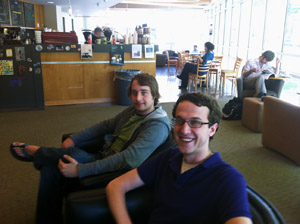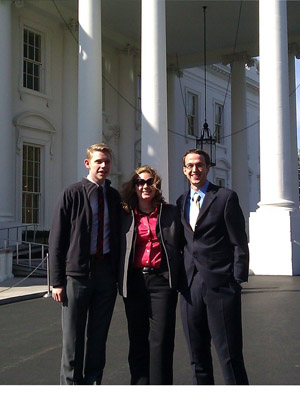Last spring senior honors student Andrew Walchuk heard an eyewitness account of covert operations in the Nixon White House just as Obama’s administration was struggling to respond to WikiLeaks’ release of U.S. State department diplomatic cables. Walchuk and 59 other students from around the country were gathered in Washington, D. C. for the Spring Leadership Conference of the Presidential Fellows Program when Egil Krogh spoke.
As head of the “the Plumbers,” a secret team charged with stopping leaks to the press, Krogh approved the burglary of the office of the psychiatrist seeing Daniel Ellsberg, who released the Pentagon Papers to the New York Times. Krogh later served four and one-half months in prison on conspiracy charges.
“It was interesting hearing from Krogh, and getting the perspective of someone who made large-scale mistakes but clearly learned from them,” Andrew Walchuk recalled, adding that Daniel Ellsberg joined the conversation via Skype. “They were at odds then but now they’re relatively close,” he said. “WikiLeaks was in the news, so we had a really interesting discussion about the balance between secrecy and freedom of information.”
This opportunity to engage in history past and present came thanks to Walchuk’s participation in the Presidential Fellows Program. Sponsored by the Center for the Study of the President and Congress, the program offers students from leading colleges and universities a year-long, up-close opportunity to study the U.S. presidency and public policy. Fellows travel to Washington, D. C. twice a year to attend three-day workshops that feature in-depth discussions with scholars, senior government officials and business leaders; behind-the-scenes tours of the Capitol and White House; and presentations by the fellows. “You meet people from all over, people who are going to provide the military and political leadership of the future,” Walchuk said.
All fellows must produce an original research paper on the presidency, Congress, or a national issue that interests them. Walchuk, a Bodenhamer fellow who has amassed 220 hours while pursuing majors in international relations/European studies, political science and Spanish with minors in Middle East Studies, Arabic, and economics, chose to focus on the relationship between U.S. promoters of democracy and the Muslim Brotherhood, an Islamist political group in Egypt that offered one of the strongest democratic alternatives to Hosni Mubarak. “I finished my paper the week Egypt began the revolution,” he said, “so my paper ended up not being so pertinent. But I was very well informed as events took place,” he said with a grin. Walchuk’s paper was one of 20 selected for publication in A Dialogue on Presidential Challenges and Leadership: Papers of the 2010-2011 Presidential Fellows.

Back on campus, Andrew Walchuk shares tips on the Presidential Fellowship program with Matt Seubert.
Matt Seubert, a rising junior Honors College Fellow majoring in international relations and economics, will participate in the Presidential Fellows Program next year. He hopes to build on his experiences in the University of Arkansas’ interdisciplinary program in Belize, where he led a micro-finance project.
“We worked with a women’s coop,” he recalled. “We gave them a small loan to help finish a restaurant and catering business. We also gave a loan to a backpackers’ hostel in Dangriga, which helped them buy a security system.” That experience was very rewarding, but Seubert would like to take aid to the next level by working with Belize’s banks to arrange such loans.
“I’d like to work with the systems they have in place, instead of picking the winners and losers,” he said. “The problem is, the banks there don’t have enough capital accumulation to cover the risks that they take.” Since he’ll be a junior this year, Seubert won’t have his fellows paper due at the same time as his senior honors thesis, as was the case for Walchuk. Nevertheless he plans to follow Walchuk’s advice to start early on the paper, and hopes to use his work as a strong start for his senior honors thesis.
As for Walchuk, this year he’ll take a well-deserved break from papers and exams, but not from the classroom. Thanks to a Fulbright scholarship he’ll be teaching English in a high school in Madrid, Spain, where he already has a contact – another Presidential Fellow who received a Fulbright will be teaching at another high school in Madrid. “It’s just a great group of students that I know have taught me a lot and that I know I will be keeping in touch with,” Walchuk said via email. “From the various military academy students to the Rhodes Scholar I befriended during my time as a fellow, they’re all going to do incredible things.”

